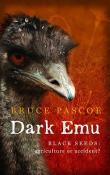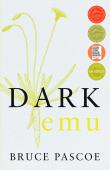AustLit
Latest Issues
AbstractHistoryArchive Description
'Dark Emu argues for a reconsideration of the 'hunter-gatherer' tag for pre-colonial Aboriginal Australians and attempts to rebut the colonial myths that have worked to justify dispossession. Accomplished author Bruce Pascoe provides compelling evidence from the diaries of early explorers that suggests that systems of food production and land management have been blatantly understated in modern retellings of early Aboriginal history, and that a new look at Australia’s past is required.'
Source: Publisher's website.
'Pascoe puts forward a compelling argument for a reconsideration of the hunter-gatherer label for pre-colonial Aboriginal Australians. The evidence insists that Aboriginal people right across the continent were using domesticated plants, sowing, harvesting, irrigating and storing - behaviours inconsistent with the hunter-gatherer tag.'
Source: Back cover blurb.
Adaptations
-
Dark Emu
Stephen Page
,
Bangarra Dance Theatre
,
2018
single work
drama
Indigenous story
'Compelling contemporary dance, soul-stirring soundscapes and uniquely Australian stories – Bangarra is a company at the peak of its powers. In superb form after the sold-out season of Bennelong, we return in 2018 with a major new dance work, Dark Emu.
'Inspired by Bruce Pascoe’s award-winning book of the same name, Dark Emu explores the vital life force of flora and fauna in a series of dance stories directed by Stephen Page. With long-time Bangarra collaborators Steve Francis (music), Jacob Nash (sets) and Jennifer Irwin (costumes) bringing their impeccable aesthetic to the production, Dark Emu will satisfy your spirit and connect you to Country.' (Production summary)
Notes
-
Dedication: to the Australians
-
Author's note: "If we look at the evidence presented to us by the explorers and explain to our children that Aboriginal people did build houses, did build dams, did sow, irrigate and till the land, did alter the course of rivers, did sew their clothes, and did construct a system of pan-continental government that generated peace and prosperity, then it is likely we will admire and love our land all the more."
-
Index Page Note:
Contains: Rock Engraving of Emu Dreaming Ku-ring-gai Chase National Park, New South Wales. Photograph by Barnaby Norris.
'Baiame, the creator Spirit Emu, left the earth after its creation to reside as a dark shape in the Milky Way. The emu is inextricably linked with the wide grasslands of Australia, the landscape managed by Aboriginals. The fate of the emu, people and grain are locked in step because, for Aboriginal people, the economy and the spirit are inseparable. Europeans stare at the stars but Aboriginal people also see the spaces in between where the Spirit Emu resides.'
Publication Details of Only Known VersionEarliest 2 Known Versions of
Other Formats
- Sound recording.
- Large print.
Works about this Work
-
Tracking Dark Emu
2021
single work
essay
— Appears in: Meanjin Online 2021; Meanjin , Summer vol. 80 no. 4 2021;'The Uluru Statement from the Heart of May 2017 was addressed to the people of Australia from 250 delegates ‘coming from all points of the southern sky’. While clearly a political manifesto, it embodied significant assertions about both history and law, declaring that the Aboriginal and Torres Strait Islander tribes were the ‘first sovereign Nations of the Australian continent and its adjacent islands, and possessed it under our own laws and customs’. This sovereignty, the statement continued, ‘has never been ceded or extinguished, and co-exists with the sovereignty of the Crown’. How could it be otherwise, the delegates asked, ‘that peoples possessed a land for 60 millennia and this sacred link disappears from world history in merely the last two hundred years?’' (Introduction)
-
Becoming a Settler Descendant : Critical Engagements with Inherited Family Narratives of Indigeneity, Agriculture and Land in a (Post)Colonial Context
2021
single work
criticism
— Appears in: Life Writing , vol. 18 no. 3 2021; (p. 355-370)'Using personal reflections from my experiences as a descendant of settlers, I undertake an autoethnographic interpretation of how my inherited family history of agriculture and memory structures my relationship to land. Agricultural identities have been foundational to the formation of the Australian nation and in the metamorphosis of settlers into settler descendants. Memories formed by settlers and inherited by their descendants as family stories become a consubstantive force in the determination of relationships to land. At the same time, I recognise how the dispossessory overtures of these sentiments continue the erasure of autochthonous Indigenous belonging by the colonial settler state. Thus, my work critically engages with how an autoethnographic approach to issues of settler colonial identity in the historical past might stifle or conversely open up critical engagement with ethical responsibility to Indigenous peoples in the political present. This analysis reflects on the broader society’s proclivity toward agricultural identities, borne out in the recent debates surrounding Indigenous author Bruce Pascoe's book. Dark Emu [Pascoe, Bruce. 2014. Dark Emu. Broome: Magabala Books monograph], which positions Indigenous people as Australia’s first agriculturalists. These trends follow scholarship that seeks to expose normative and racist beliefs about Indigenous others through attentiveness to troubled colonial history.' (Publication abstract)
-
Whitefella Magic : A Posthumanist Take on the Dark Emu Debate
2021
single work
essay
— Appears in: Overland [Online] , August 2021;'The Sutton and Walshe book, Farmers or Hunter-Gatherers?, did not start the debate over Pascoe’s Dark Emu, but it has certainly escalated it to a broader public. Now there are numerous reviews, essays and opinions, from Geoffrey Blainey in The Australian (an ideological rant that even manages to drag in the Federal Labor leader for criticism) to Guy Rundle in Crikey (tying himself in rhetorical knots trying to defend Pascoe). It’s another battle in the culture wars, reminiscent of the one led by Keith Windschuttle on Aboriginal history twenty-odd years ago. Is that really what Sutton and Walshe wanted? Or do they just want to defend the pursuit of truth by the best possible means?' (Introduction)
-
Reading Indigenous Australian Literature Transnationally : Juxtaposing Dark Emu and Kocharethi
2021
single work
criticism
— Appears in: JASAL , vol. 21 no. 2 2021;'This essay is an enquiry into literary subversions of the colonial myth that civilization began with recognizable forms of labour practiced under sedentary agriculture and that land rights rest with precisely those who built complex systems of farming on fixed territory year after year. It draws from my doctoral research on the intersections between Indigenous literature produced in Australia and India. In Australia, Indigenous peoples were en masse labelled as hunter-gatherers or nomads as opposed to the colonists who arrived in 1770. Historian Prathama Banerjee has noted that in India, ‘those who came to be classified as tribes in modern times were precisely communities who were not fully identifiable as sedentary cultivators, though many communities were indeed agriculturists of various sorts, and therefore could not be mobilized simply in the name of labour and productivity’ (11-12). In a revisionist mode, Bunurong, Yuin, Tasmanian historian and author Bruce Pascoe’s Dark Emu (2014) and Malayarayar writer Narayan’s Kocharethi (2011) challenge us to rethink concepts of land rights, ownership, wasteland vs. agricultural land, and human labour. By presenting a transnational reading of Dark Emu and Kocharethi, this essay intends to explore how land-labour relations have been imagined, valued and practiced within Indigenous literatures and how writers continue to resist colonial and (post)colonial ideas on the same.' (Publication abstract)
-
How the Dark Emu Debate Limits Representation of Aboriginal People in Australia
2021
single work
column
— Appears in: The Conversation , 8 July 2021;'Anthropologist Peter Sutton and archaeologist Keryn Walshe, recently published a book titled Farmers or Hunter-gatherers? The Dark Emu Debate. This book offers a dramatically different account of the social, spiritual and economic worlds of Australia’s First Peoples “before conquest” to what is presented in the acclaimed work by Yuin writer Bruce Pascoe, Dark Emu.' (Introduction)
-
Book Review: Dark Emu, Black Seeds: Agriculture or Accident? by Bruce Pascoe
2009
single work
review
— Appears in: LisaHillSchoolStuff's Weblog 2009;
— Review of Dark Emu : Black Seeds : Agriculture or Accident? 2014 single work criticism -
[Review Essay] Dark Emu, Black Seeds : Agriculture or Accident
2014
single work
review
— Appears in: Aboriginal History , December vol. 38 no. 2014; (p. 195-198)
— Review of Dark Emu : Black Seeds : Agriculture or Accident? 2014 single work criticism -
[Review] Dark Emu
2020
single work
review
— Appears in: AQ : Australian Quarterly , January - March vol. 91 no. 1 2020; (p. 21)
— Review of Dark Emu : Black Seeds : Agriculture or Accident? 2014 single work criticism'Reading Dark Emu is both a stimulating and uncomfortable experience. Stimulating because of the astonishing paradigm shift it heralds for our understanding of Australia's indigenous history. Uncomfortable because of the ignominy of our collective ignorance.' (introduction)
-
Indigenous Writer Bruce Pascoe : 'We Need Novels That Are True to the Land'
2016
single work
column
— Appears in: The Guardian Australia , 18 February 2016; 'The writer of mixed Indigenous heritage says rather than books about white or black people, Australia needs great novelists writing truthfully about the land.' -
NSW Premier's Literary Awards Shortlist Indigenous and Climate Change Stories
2016
single work
column
— Appears in: Brisbane Times , 14 April 2016; 'Tony Birch has been many times a bridesmaid, but there is one literary prize he wouldn't mind losing – the new standalone prize for indigenous writers announced as part of the 2016 NSW Premier's Literary Awards' shortlist on Thursday. ...' -
Indigenous Storytelling Has Always Been in Our Blood
2016
single work
column
— Appears in: The Sydney Morning Herald , 17 March 2016; (p. 2) -
Pascoe’s History a ‘Vision of an Australia Yet to Be’
2016
single work
column
— Appears in: National Indigenous Times [Online] , 17 May 2016;'Bunurong man, Aboriginal language guru and jack of all trades Bruce Pascoe has taken out one of the country’s most prestigious literary awards with his latest work, Dark Emu.'
'The Victorian writer won Book of the Year category and shared the inaugural Indigenous Prize at the NSW Premier’s Literary Awards announced at the State Library of NSW in Sydney last night.'
'Ellen van Neerven’s Heat and Light shared the indigenous award and $30,000 with Pascoe.'
-
Recognising Sovereignty: Bruce Pascoe’s Latest Book A Dark Horse To Lead Battle Over Unfinished Business
2016
single work
interview
— Appears in: New Matilda 2004-; 'Amy McQuire interviews acclaimed First Nations author Bruce Pascoe, and asks the question why Australia has so readily embraced his book – Dark Emu – and its truths. Does it now mean they must embr ace the issue of sovereignty and treaty?'
Awards
- 2016 winner New South Wales Premier's Literary Awards — Book of the Year
- 2016 joint winner New South Wales Premier's Literary Awards — Indigenous Writer's Prize
- 2014 shortlisted Queensland Literary Awards — History Book Award
- 2014 shortlisted Victorian Premier's Literary Awards — Prize for Indigenous Writing







